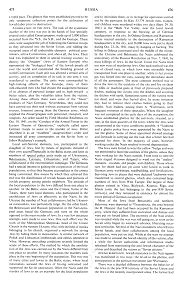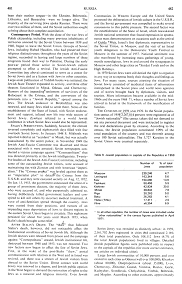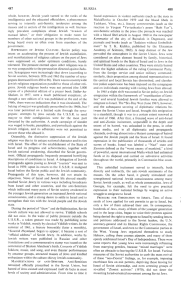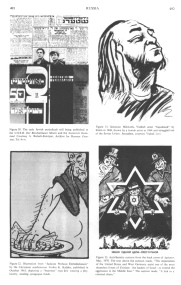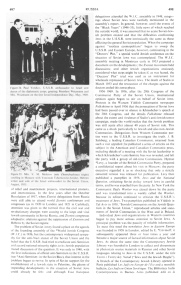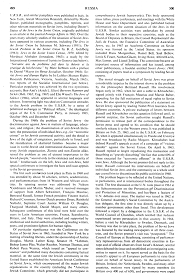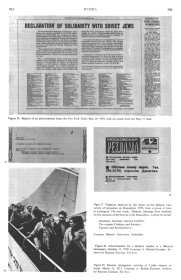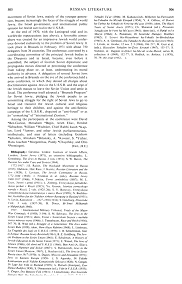Trials and NS antisemitism working after 1944 - "SU" supports the foundation of Israel with the hope for another satellite - Stalin's general punishment and persecutions against Russian Jewry since 1949 - census 1959 and 1970 - emigration
Encyclopaedia Judaica (1971): Russia: Jews in "Soviet Union", vol.14, col. 489, Hebrew- Russian alphabet
from: Russia; In: Encyclopaedia Judaica, vol. 14
presented by Michael Palomino (2008)
| Teilen
/ share: |
Facebook |
|
Twitter |
|
|
|
Recovery of the "Soviet Union" since 1945
[After 1944: trials under "Soviet" leadership]
<The enormity of the Nazi crime was revealed while the war was still going on, as soon as the Soviet army began its westward advance, liberating occupied territories. Several of the Nazi murderers who fell into Soviet hands, and their collaborators among the local population, were put on trial. While at the start no attempt was made to conceal the Jewish identity of the victims, after a while the Soviet authorities and information media refrained from mentioning the anti-Jewish character of the crimes and described the victims as "Soviet citizens".> (col. 476)
[[Many mass murderers of eastern Europe succeeded in the flight to western sectors and disguised themselves in the DP camps under a new name and identity as Jewish refugee and were even helped to emigrate to overseas]].
[Heavy anti-Semitism in the local population after the NS withdrawal - fight for housing and positions]
<When in 1943-44 the Soviet army liberated the occupied areas, not only was the holocaust of the Jewish communities revealed, but also the hatred of the Jews that the Nazis had successfully aroused and encouraged among the local population. This hatred was further intensified by the attempts of the few returning Jews to regain their houses and positions. In numerous instances Jews who had survived the war and tried to reestablish themselves in their old homes were murdered by their erstwhile [[former]] neighbors. Liberated [[communist occupied]] Kiev was the scene of a pogrom, in which a number of Jews lost their lives [[in 1946]].> (col. 480).
[1945-1948: Returning Jews from central Russia - emigration and trial of a Jewish revival]
With the close of the war Jews of Polish citizenship, including many previous inhabitants of territories annexed by the Soviet Union between 1939 and 1940, began to leave the Soviet Union. Groups of Soviet Jews, including Habad Hasidim, who had preserved their religious distinctiveness throughout the years of the Soviet regime, succeeded in leaving and large numbers of these emigrants found their way to Palestine. During the early postwar period those active in Soviet-Jewish culture attempted to effect a revival.
The Jewish Anti-Fascist Committee (see above) continued to serve as a center for Soviet Jewry and as a liaison with Jews in other countries. Large-scale publication of Yiddish books was initiated, the Jewish State Theater expanded its activity, and three other theaters functioned in Minsk, Odessa, and Chernovtsy. Rumors of the impending [[upcoming]] settlement of survivors of the Holocaust in the Crimea, and the conversion of the peninsula into a "Jewish Republic", spread among the Jews. The Jewish endeavor in Birobidzhan was also renewed, and many Jews tried to settle there. News of the establishment of the State of Israel, with Soviet endorsement and support [[Stalin wanted Israel as a communist satellite, but it was a racist CIA Herzl Israel at the end]]infused new life into wide sectors of Soviet Jewry. [[The newspaper of the Jewish anti-Fascist Committee]] Eynikayt referred to a world Jewish conference in which Soviet Jews would also be represented. (col. 481)
"Soviet" relations with Israel and Jewry 1947-1963
[1947: "Soviet Union" supported the foundation of Israel in the hope for another satellite state]
[[In 1947 Stalin supported the foundation of Israel with the hope that Israel would become a communist satellite. When the Jewish regime of Ben Gurion turned out to become a racist, Free Mason, Zionist Herzl regime Stalin cut off all ties and collaborated with the Arab states against the Zionist and Herzl fantasy and madness of a "Greater Israel" from the Nile to the Euphrates river (according to 1st Mose chapter 15 phrase 18). Herzl said openly that all Arabs have to be driven away comparing them with the natives of the "USA". The details of "Soviet" policy are in the article of Encyclopaedia Judaica - but the big correlation with the Zionist and Herzl "dream" and madness is not shown in Encyclopaedia Judaica. Many Jews in Israel don't want any Zionist policy but until now (2008) this madness does not stop because of Arab extremism. And the worst enemy of Jewry - the criminal Church with it's home for old aged named "Vatican" - is never mentioned in Encyclopaedia Judaica either, and the Church never signed human rights until now (2008) either. The Jewish problem cannot be solved by a Jewish state, but by peace between the religions - but peace is not wanted by the religious leaders as it seems...]]
SOVIET SUPPORT (1947). ["Soviet" voices in UN for Israel foundation and partition of Palestine]
Encyclopaedia Judaica (1971): Russia: Jews in "Soviet Union", vol.14, col. 493, excerpt from the speach of Gromyko at the UN 1947
The first public announcement of Soviet support for the establishment of a Jewish state in Palestine was made by Andrei Gromyko, deputy foreign minister and head of the Soviet delegation to the United Nations, on May 14, 1947, at the First Special Session of the General Assembly. He dwelt on the urgency of the Palestine problem, on the sufferings of the Jewish people during the war, and the hundreds of thousands of survivors who were wandering about in various countries of Europe.
Dismissing any unilateral solution as unjust, Gromyko expressed his government's preference for the establishment of "an independent, dual, democratic, Arab-Jewish State". If this plan proved impracticable, because of the deterioration in relations between the Jews and the Arabs, it would be necessary to consider "the partition of Palestine into two independent states, one Jewish and one Arab."
There was an earlier intimation [[allusion]] of a possible change in the traditional negative Soviet attitude toward [[Herzl]] Zionism, when, on May 3, 1947, the Soviet delegation supported the Jewish Agency's demand to be heard at the Assembly as the representative of the Jewish population of Palestine. Nevertheless, the above-mentioned speech came as a complete surprise, and was regarded as a decisive turning point in Soviet policy. (col. 493)
This had been preceded by contacts between Zionist leaders and Soviet representatives in various capitals established after the U.S.S.R.'s entry into the war against Germany in 1941. During the war there were also visits of Soviet diplomats to Palestine, during which they expressed appreciation for the achievements of the yishuv [[Jews in Palestine before 1948]]. In March 1945 Zionist leaders were informed by the White House that Stalin, *Roosevelt, and *Churchill had agreed to hand over Palestine to the Jews. These developments, however had not been widely known, and were followed, and seemingly contradicted, by over two years of evasiveness on the Palestine issue accompanied by a number of pronouncements opposing the Zionist position on Palestine's political future. The U.S.S.R. was vitally interested in the British withdrawal from Palestine and, indeed, the entire Middle East, and apparently believed this could be achieved by the establishment of a Jewish state [[which should be a communist satellite for Stalin]]. It was therefore in the Soviet interest to support the idea of partitioning the country [[and the Arabs were never asked]]. At the regular session of the General Assembly in the fall of 1947, the Soviet Union joined forces with the United States, and the two great powers voted for partition on Nov. 29, 1947.
[Y. ROI.]
[[The Arabs are not asked...]]
SOVIET POLICY IN THE MIDDLE EAST.
However, apart from the favorable attitude displayed by the U.S.S.R. at the 1947-48 debates and votes at the U.N., and its initial friendliness to the emerging state, relations between the two countries steadily deteriorated. Support for the Jewish state, as expressed by Gromyko in 1947, underwent a gradual, yet drastic, transformation which in June 1967 (at the end of the Six-Day War) resulted in the complete rupture of diplomatic ties and an all-out Soviet diplomatic and propaganda campaign against Israel. The reasons for this deterioration are to be found in Soviet foreign and domestic aims and the tactics employed to achieve them.
Soviet policy in the Middle East was based on a combination of three factors. The first was the traditional Russian objective (initiated by the czars) of achieving a position of power in the Middle East by gaining a foothold in the area, dislodging its great-power adversaries and then establishing broad, if not exclusive, influence there. The second, an "ideological" factor, was the role played by the U.S.S.R. as the leader of the Communist world and as protagonist in the "anti-imperialist", anti-Western, struggle. Finally, there was the "Jewish problem" within the U.S.S.R. and Soviet opposition to the idea that Israel might provide a possible solution. In spite of the glaring contradiction between the Soviet attitude in 1947 and the policy pursued in 1967, the basic aims did not alter. In 1947 the Soviet Union sought to further its ends by support of Israel; in 1967 it resorted [[began to]] to outright [[absolute]] hostility toward Israel in order to achieve its purpose.
[[Arabs are not mentioned, but the Arabs set up self-defense against the Jews as the Jews had set up self-defense against Russian pogroms. But Zionist Herzl Jews were worse: They had the intention to establish a "Jewish state"...]]
The development of Soviet-Israel relations falls into six distinct periods.
[1.] 1947 - BEGINNING OF 1949.
["Soviet" interests for a satellite on the Mediterranean Sea - English interest for oil and colonial chain of countries]
In the "honeymoon" period of Soviet-Israel relations between 1947 and the beginning of 1949, the U.S.S.R. campaigned at the U.N. for the establishment of a Jewish state in a part of Palestine and cooperated with the Jewish Agency and the yishuv [[Jews in Palestine before 1948]] in order to achieve this goal. Official Soviet spokesmen and the Soviet press supported the armed struggle of the yishuv [[against Arab self-defense]] and branded Arab armed resistance to the establishment of the state as a function of British imperialism.
When the establishment of the state was declared, the Soviet Union was the first to accord it de jure recognition and to appoint a minister to Israel. It provided Israel with arms (by way of Czechoslovakia) and economic assistance (by way of Poland), and permitted large-scale emigration of Jews to Israel from all countries of Eastern Europe, except from the (col. 494)
Soviet Union itself. The fact that the military and economic assistance was supplied indirectly, rather than directly from the Soviet Union, was not, at the time, regarded as having any negative connotation. It should be borne in mind that even at this stage when Arab nationalism derived [[took]] its main support from Britain, the Soviet Union's principal adversary in the area, the U.S.S.R. emphasized its intention to become a source of support and protection to the Arabs.
Thus, in a speech made on Nov. 26, 1947 - only three days before the partition resolution was to be passed - Gromyko assured the Arabs that the Soviet Union would continue to support their efforts "to rid themselves of the last fetters of colonial dependence", and expressed his conviction that in spite of their momentary misgivings, the Arabs and the Arab states "will still, on more than one occasion, be looking toward Moscow".
The purpose of Soviet pro-Israel policy at this time was clearly outlined in "The Palestine Problem", a booklet by J.A. Genin, published in Moscow in October 1948. Stressing the importance of Palestine for British economic interests, the author states that "the loss of Palestine will be a terrible blow to the British oil magnates. British departure from Palestine will be a severe defeat for British colonial [[racist]] interests, and its effects will not be confined to the Middle East. Britain will lose an important link in the chain of Middle Eastern countries dependent upon her, and her route from the Mediterranean to the Persian Gulf will be cut off."
The Soviet Union also found it necessary to dispel at once any illusion that many Soviet Jews may have had about their future relations with Israel. Some Jews had asked for permission to go to Israel and join the ranks of the Israel army, and a mass demonstration outside the Great Synagogue in Moscow had welcomed Golda Meir, the first Israel minister to the Soviet Union. This was not to be tolerated. An article by Ilya *Ehrenburg, published in Pravda [[Truth]] on Sept. 21, 1948, made it clear that Soviet Jews should have nothing to do with Israel, a foreign and remote capitalist state:
"Soviet Jews do not look to the Near East; they look to the future."
[[Capitalist racist Free Mason Zionist Herzl was provoking an eternal war against the Arabs. This was no future. Ehrenburg was right. But communism was manipulating human being and the ruble had no base so the population was calculating in dollars and environment was destroyed in big parts of the "SU". Also this was no future. This Ehrenburg forgot to say...]].
[2.] 1949-1953. [Stalin's alienation from Herzl Israel and massive measures against the Jews in the "SU"]
Between 1949 and 1953, when the Cold War was at its height [[which became a "hot war" in Corea and Vietnam and in Africa later]] and Stalin sought to make the Soviet Union impregnable to any influence from without, relations with Israel took a turn for the worse. There was open anti-Semitism in the Soviet bloc culminating, in the last days of Stalin, in the "Doctor's Plot",and the *Slanský Trial in Prague where the Israel minister was declared persona non grata.
At the U.N. the Soviet Union no longer gave Israel its support. When Israel complained to the Security Council on the Egyptian blockade of the Suez Canal, the Soviet Union abstained [[give no vote]] on the resolution put before the council. The Soviet Union refused an Israel request for technical aid, and emigration to Israel from all countries of Eastern Europe came to an end. Only the economic ties were not seriously affected. Finally, in February 1953, about a month before Stalin's death, a bomb which exploded in the courtyard of the Soviet embassy in Tel Aviv served the U.S.S.R. as a pretext for breaking off diplomatic relations with Israel.
[3.] 1953-1956
In July 1953 diplomatic ties between the two countries were resumed and there was a slight improvement in the tone of diplomatic exchanges and of Soviet press commentary on [[racist Herzl]] Israel. In essence, however, there was no real halt to the deterioration of the Soviet attitude on [[racist Herzl]] Israel. On Jan. 22, 1954, the U.S.S.R. cast its first anti-Israel veto at the U.N. Security Council. On Jan. 9, 1956, the Soviet delegation even took the initiative of proposing an anti-Israel resolution at the Security Council.
[[This anti-Israel resolution was blocked by the racist Free Mason forces and CIA forces of the "USA" of course]].
[4.] 1956-1963
Subsequently the U.S.S.R. adopted a policy of open and one-sided support of Arab bellicosity against (col. 495)
Israel. In the fall of 1955 the Soviet Union concluded an arms agreement with Egypt (officially it was Czechoslovakia that supplied the arms). Relations with Israel reached a new low in 1956 when, in the wake of the *Sinai Campaign, the Soviet Union unilaterally abrogated the commercial agreement between the two countries.
[[Egypt was nationalizing the Suez Canal and England and France had supported the Jewish army to invade Sinai peninsula up to the Suez Canal, (which was the foreseen Zionist frontier of the Nile river for a "Greater Israel" according to the 1st Mose chapter 15 phrase 18). Later UN troops were stationed around the Suez Canal, see: http://en.wikipedia.org/wiki/Sinai_Campaign]]
Until 1955 there had been a premising development in the exchange of goods. In 1954 the trade amounted to over $3,000,000; but in the following year it was little over half that sum, and a further reduction took place in 1956.
During the Sinai Campaign (1956) Soviet policy was decidedly pro-Egyptian and anti-Israel. Threatening notes were sent from Moscow to the Israel government demanding unconditional withdrawal from the occupied Sinai Peninsula. In the United Nations the Soviet and U.S. governments exerted concerted pressure on [[racist Free Mason Zionist CIA Herzl]] Israel [[regime]]. (col. 496)
Persecutions of the Jews in "Soviet Union" since 1948
STALIN'S PERSECUTIONS. [CIA Free Mason Herzl Israel and general punishment of "Soviet" Jewry with destruction of Jewish institutions in "SU"]
Suddenly, however, the climate reversed completely and nightmarish days filled with fear overtook Soviet Jewry. (col. 481)
[[There had been big hope of "Soviet" Jewry 1945-1948, but when Israel Zionist regime turned into a racist CIA Herzl Jewish government in a Herzl Israel Stalin felt encircled again like 1939 - it can be admitted that Stalin knew that the "US" industry and banks and many other western leaders had financed Hitler's regime. So Stalin began to pursue all Jews in "Soviet Union" since 1948, many by gulag penalties, and emigration and communication with abroad was absolutely forbidden behind the Iron Curtain. The communist satellite states were more or less also pursuing the Jews, but without gulag. Add to this all the communist states got their money - from banks from the "USA"...]].
[Yiddish culture destroyed step by step after 1948]
<The events of the "Black Years" (1948-53)> (col. 498)
<It soon became clear, however, that the Soviet Union [[after 1948 after the foundation of Herzl Israel collaborating with CIA]] had no intention of permitting a postwar revival of Yiddish schools and the Yiddish press. [...] (col. 480)
[[There were 100,000s of Jews speaking Yiddish yet coming back from central "Soviet Union" after 1946 or even staying in central "Soviet Union", see the census of 1959]].
The majority of the surviving Jews spoke Russian. There were over two million of them, and the Soviet authorities sought to bring about their complete assimilation.> (col. 481)
In January 1948 S. Mikhoels was reported killed in an "accident" in Minsk, but was actually assassinated by the secret police; in November 1949 the Jewish Anti-Fascist Committee was dissolved and those associated with it were arrested; Soviet newspapers conducted a vicious campaign against "*Cosmopolitans" that was directed primarily at the Jewish intelligentsia. Twenty-five leaders of the Jewish Anti-Fascist Committee, including some of the outstanding Jewish writers, were accused of maintaining ties with Zionism and with American "imperialism". The "Crimea project" was leveled against them as an "imperialist plot" to detach the Crimea from the U.S.S.R. and they were executed secretly on Aug. 12, 1952. [[see: *Crimea]]
On Jan. 13, 1953, the government announced the arrest of a group of prominent doctors, the majority of them Jews, who were accused of, and who purportedly admitted to, having deliberately killed government leaders and conspired to kill still others by incorrect medical treatment. A wave of anti-Semitism spread through the country. Jews were ousted from their positions, and rumors of an impending mass deportation of Jews to distant regions in the eastern Soviet Union began to circulate. This nightmare persisted for about five years until March 1953, when Stalin's death brought some relief. [[Gulag and Iron Curtain are never mentioned in Encyclopaedia Judaica...]]
AFTER STALIN'S DEATH
The "thaw" [[better atmosphere]] that followed Stalin's death, however, did not noticeably affect the fundamental conditions of Soviet Jewish life. Although the Jewish doctors were released from prison and the campaign against "Cosmopolitans" ceased, Jewish institutional life, destroyed between 1948 and 1953, was not restored. Two new factors now began to affect the fate of Soviet Jews.
First, in the wake of the post-Stalin "thaw", postal communication with relatives in the West and in Israel was revived, and there was a stream of Jewish visitors from abroad to the Soviet Union. Direct contact with world Jewry was renewed to a degree, and Jewish public opinion in the West began to demand the restoration of rights to the Jews as a national and religious minority. Even Jewish (p. 481)
Communists in Western Europe and the United States protested the obliteration of Jewish culture in the U.S.S.R., and the Soviet government was compelled to make several concessions to this public pressure.
The second factor was the establishment of the State if Israel [[racist Herzl Israel, with a dream of the Zionists of a "Greater Israel" from the Nile to the Euphrates according to 1st Mose chapter 15 phrase 18]], which reawakened Jewish national sentiment that found expression in spontaneous mass demonstrations on occasions such as the arrival of Golda *Meir, Israel's first diplomatic representative to the Soviet Union, in Moscow [[Meir was one of the Jewish Free Masonry government members]], and the visit of an Israel youth delegation to the Democratic Youth Festival in Moscow in the summer of 1957. [[Settlement in communist Moscow was always limited and the big part of the Jews had no possibility to go there]].
Encyclopaedia Judaica (1971): Russia: Jews in "Soviet Union", vol.14, col. 490, Moscow Jews welcoming the Israel Youth delegation to the Democratic Youth Festival, 1957
National sentiment was also manifested by increasing mass gatherings of young, mostly nonreligious, Jews in and around the synagogues in Moscow and other large cities on *Simhat Torah and on the High Holidays. (col. 482)
Unofficial Jewish publications in the 1950s in criminal Gulag "Soviet Union"
The census of 1959
Encyclopaedia Judaica (1971): Russia: Jews in "Soviet Union", vol.14, col. 485-486, map of 1959
In the Soviet population census of 1959, 2,267,814 persons were registered as of "Jewish nationality" (the census takers did not demand to see any personal document and were instructed to register the oral declarations given by citizens). According to the census, the Jewish population constituted 1.09% of the total population of the country and was eleventh among over 100 Soviet nationalities. The 5,727 Karaites in the Soviet Union were counted separately.
Table 9. Jewish population in capitals of the Republics in 1959
Town
Number of Jews
% of total population
Moscowxxxxxxxxxxx
239,246xxxxxxxxxxxxxxx
4.7%xxxxxxxxxxxxxxx Leningrad
162,344xxxxxxxxxxxxxxx 5.6%xxxxxxxxxxxxxxx Kiev
153,466xxxxxxxxxxxxxxx 13.9%xxxxxxxxxxxxxxx Tashkent
50,455xxxxxxxxxxxxxxx 5.5%xxxxxxxxxxxxxxx Kishinev
42,934xxxxxxxxxxxxxxx 20.0%xxxxxxxxxxxxxxx Minsk
38,842xxxxxxxxxxxxxxx 7.6%xxxxxxxxxxxxxxx Riga
30,263xxxxxxxxxxxxxxx 5.0%xxxxxxxxxxxxxxx Baku
26,263xxxxxxxxxxxxxxx 4.1%xxxxxxxxxxxxxxx Tbilisi (Tiflis)
17,311xxxxxxxxxxxxxxx 2.5%xxxxxxxxxxxxxxx Vilna
16,354xxxxxxxxxxxxxxx 6.9%xxxxxxxxxxxxxxx from: Russia; In: Encyclopaedia Judaica, vol. 14, col. 482
Soviet Jewry was revealed as distinctly urban: in 1959, 2,161,702 Jews registered in cities and constituted 2.16% of their total population. Only 108,112 Jews (4.7% of the total Jewish population) lived in villages. Detailed Jewish population figures were published only in respect to the capitals of the republics (for more correct estimates, see articles on individual cities).
Large Jewish communities of 10,000 persons and over existed in such cities as Odessa (well over 100,000), Kharkov (about 80,000), Dnepropetrovsk (about 35,000), Lvov [[L'viv]], Chernovtsy, Zhitomir, Gomel, Vinnitsa, Rostov, Gorki, Kuibyshev, Sverdlovsk, Chelyabinsk, Vitebsk, Bobruisk, and Mogilev.
According to other estimates, approximately (col. 482)
60 cities in the Soviet Union had a Jewish population exceeding 10,000. Like the general demographic situation in the Soviet Union, as a result of the high proportion of wartime male fatalities, Jewish women outnumbered men with about 120 women per 100 men (a total of 206,556 more women than men).
According to the 1959 census a total of 1,733,183 Jews (76.4%) declared Russian as their mother tongue; 46,845 declared other foreign languages (half of this number declared Ukrainian); 403,900 (about 18%) declared Yiddish; 35,673 Georgian (Georgian Jews); 25,225 Jewish Tat (*Mountain Jews); and 20,763 Tajiki (Bukharan Jews).
It may well be assumed that a considerable number of Jews whose real mother tongue was Yiddish declared Russian as their national language; at the same time there were Jews who declared Yiddish as their mother tongue without really knowing it, in order to demonstrate their identification with the Jewish people. The highest percentage of Yiddish-speaking Jews was found in Lithuania (69%), Moldavia (50.3%), and Latvia (48%).
the census data indicate several facts:
hundreds of thousands of Soviet Jews declared themselves to be of non-Jewish nationalities; the majority of Russian-speaking Jews declared their attachment to the Jewish people ("nationality"), among them certainly the vast majority of its younger generation; Yiddish-speaking Jews, of whom there were approximately 500,000, were mostly members of the older generation and inhabitants of the western regions of the Soviet Union (Lithuania, Latvia, Moldavia, the districts of Chernovtsy, Lvov [[L'viv]], Volhynia, western Belorussia [[Belarus]]);
there were oriental (i.e., non-Ashkenazi) Jews, who, according to the census, numbered about 100,000, belonging to the Georgian, Tat, and Bukharan communities. The latter preserved their Jewish way of life, maintained traditional family life and ties with the Jewish community and synagogues, and observed the dietary laws and the Sabbath to a far greater extent than did Ashkenazi Jews. (col. 483)
[Jewish professions according to the 1959 census]
The 1959 census showed that Jews played a negligible role in Soviet agriculture. Most of the 100,000 Jews living in rural areas were officials or experts and belonged to the officialdom of the sovkhozes and the kolkhozes. Few Jews were counted in the villages of the areas previously settled by Jewish farmers: 2,765 in the Crimean district; 881 in Kherson; and 2,292 in Birobidzhan.
On the other hand, Jews occupied a prominent position among the Soviet intelligentsia. In the 1960/61 academic year, 77,177 Jewish high school students were accounted for (3.22% of the general student body and three times their proportion to the general population, although not exceeding their proportion to the urban population). Among "those with a secondary and higher education" (a term which encompasses [[includes]] doctors, officials, bookkeepers, engineers, and so on) there were 427,000 Jews at the end of 1960,i.e., 4.9% of this entire class. This was the predominant class among Soviet Jews. They held a notable place also among "scientific workers" (36,173 in 1961, 9% of the total number). This group enjoys numerous privileges customarily granted to such a category under Soviet rule.
Jews in "Soviet Union" 1959-1970
The decisive factor of the racist Zionist Free Mason CIA Herzl Israel regime
[5.] 1963-1967
From 1963 to 1967 there was a slight improvement in Israel's relations with some of the Eastern bloc countries, and for a while there was some indication that relations with the Soviet Union would also improve. Some informal cultural exchange took place. In addition, an agreement was reached in 1964 on the purchase, buy the government of Israel, of real property in Israel owned by the Russian Orthodox Church. But hopes that this agreement would result in the resumption of bilateral trade were not realized. A further deterioration took place in the spring of 1966, after a group of officers belonging to the left wing of the Baath party seized power in Syria and stepped up aggression against Israel (including terror acts by the newly created Al-Fath). [[Racist Herzl]] Israel, on its part, made continuous efforts to arrive at a fruitful dialogue with the Soviet Union, persisting in these efforts up to the eve of the Six-Day War.
[6.] AFTER 1967 ["Soviet Union" playing with false news to the Arab partners and bringing war to Middle East]
On the last day of the Six-Day War, June 10, 1967, the Soviet Union severed diplomatic relations with Israel, and the rest of the East European countries, with the exception of Rumania [[Romania]], followed its lead. In the period of tension that preceded the war, the Soviet Union displayed an extreme anti-Israel attitude, which, in fact, played a decisive role in fomenting [[provoking]] the crisis and precipitating [[provoking]] the war. It was the Soviet Union which spread the canard [[false news]] that Israel had concentrated troops on its northern border for an imminent attack on Syria; and it was the Soviet Union that urged Egypt to take countermeasures against this alleged threat to Syria. The U.S.S.R. encouraged Egypt in its aggressive steps, i.e., the demand for the removal of U.N.E.F., the concentration of huge forces in the Sinai Peninsula, the closing of the Tiran Straits, and the military pact with Jordan.
[[During Six-Day War the Jewish Zionist Herzl regime of Jerusalem extended the frontiers of Herzl Israel to the Suez canal and to Jordan river, a step toward "Grater Israel", as Moshe Dayan said in his works. The Jewish regime had taken the false play of the "SU" as a pretext to extend it's territory. The reaction of the "SU" to this Free Mason work lead by CIA and criminal "USA" was not positive]].
Perhaps the Soviet Union had not wanted Egypt to engage in actual war and had hoped that the Arabs and the U.S.S.R. would achieve an easy prestige victory. At any rate, Israel's lightning victory over the Arabs frustrated such expectations. To make up for this tremendous setback, the Soviet Union speedily rearmed and rehabilitated the Egyptian and Syrian forces, and gave unrestrained support, by diplomacy and propaganda, to Arab pressure for Israel's withdrawal from the occupied areas without peace negotiations. The U.S.S.R. utilized Arab hostility toward Israel to strengthen the Arab anti-American and anti-Western attitude and to increase Arab dependence on the Soviet Union. The slogans "Soviet-Arab Alliance" and "Israel, the present-day Nazis", as well as the anti-Israel campaign in the Soviet press with its anti-Semitic overtones, have characterized contemporary Soviet propaganda and policy on the Middle East.
[E.P.]> (col. 496)
[Developments of Jewry in "SU" after 1959: Jewish Nobel Prize winner - Khrushchev campaign against bribes and concealment]
In 1962 the Jewish physicist Lev *Landau was awarded the Nobel Prize. Similarly, Jews constitute about 10% of Soviet writers and represent a higher proportion in the other arts.
The Jewish role in the state commercial establishment was considerable. In the early 1960s, during the regime of Nikita Khrushchev, when the government initiated a fierce campaign against widespread illegal economic practices, including illegal production and marketing of scarce consumer goods as well as bribery and embezzlement [[concealment]], Jews were deliberately singled out for punishment. The campaign was entrusted to the secret police according to new, very harsh decrees, including the death penalty. Jews constituted such a high proportion of those sentenced to death or long periods of imprisonment that disinterested investigations (such as that of the International Commission of Justs in Geneva) affirmed that Jews served as scapegoats to deter the rest of the population, probably because the latter might have rebelled and reacted strongly to direct attack by the authorities.
It is safe to assume that many Jews were engaged in work in cooperatives and government projects. Similarly, a limited class of Jewish industrial workers existed. On the (col. 484)
whole, however, Jewish youth turned to the ranks of the intelligentsia and the educated officialdom, a phenomenon serving to intensify anti-Semitic tendencies among the masses and in sectors of the intelligentsia as well. Increasingly prevalent complaints about Jewish "evasion of manual labor", or their obligation to make room for members of other national groups in the professions, were being heard every so often even from members of the government.> (col. 487)
REPRESSION OF JEWISH CULTURE. [persecuted Jewry in "Soviet Union" since 1959 - bad news about Zionist CIA Herzl Israel - partly revival of Yiddish culture]
Soviet policy was intent on accelerating the process of Jewish assimilation, and manifestations of religious culture on the part of Jews were suppressed or, under optimum conditions, barely tolerated. The pressure exerted upon other religions was on no way comparable to the persecution directed against Judaism. Synagogues were increasingly shut down (according to Soviet sources, between 1956 and 1963 the number of synagogues decreased from 450 to 96). [[They were mostly blamed of espionage by Jewish agents from Herzl Israel when western books were distributed from the "class enemy", and by this there was enough reason to close a synagogue]].
There was no country wide Jewish religious organization parallel to those of other religions. Jewish religious books were not printed (the 3,000 copies of a photostat edition of a prayer book Siddur ha-Shalom, in 1957, were a much publicized exception; although a new edition of it was published at the end of the 1069s, there were no indications that it was circulated). The baking of mazzot [[unleavened bread]] was gradually proscribed in the 1960s, but was later permitted on a limited scale through the synagogues; attempts by Jews outside the U.S.S.R. to send mazzot to their coreligionists were for the most part thwarted [[stopped]] by the authorities. A crude campaign of slander was waged in books, pamphlets, and periodicals against the Jewish religion, and its adherents were not permitted to answer those who abused it. [[This was mostly general accusations as in the Third Reich, and leaflets against racist Zionism in Palestine]].
Ostensibly, the distinctive suppression of the Jewish religion was due to its unique national character and its ties with [[racist CIA Herzl Zionist regime of]] Israel. The effect of the establishment of the State of Israel and its progress and achievements, together with Jewish national awakening, disturbed the Soviet government. Official propaganda frequently presented horrifying descriptions of conditions in Israel [[but these descriptions were true!]]. A delegation of Jewish propaganda agents posing as Jewish "tourists" was sent to [[Herzl]] Israel in 1959; upon its return to the U.S.S.R. it maligned Israel before the Soviet public and the Jewish community. Propaganda of this type, however, did not attain its objectives. News of Israel and Jewish life abroad steadily reached Soviet Jewry in various ways including broadcasts from Israel and other countries, and the anti-Semitism which infiltrated many parts of Soviet society awakened in the younger Jewish generation an increased Jewish national consciousness, and a strong desire to settle in Israel and to strengthen their ties with the Jewish people and the Jewish state.
[[Racism of and spreading hatred by the Herzl Zionist regime against Arabs and the expulsion of the Palestinians is never mentioned in Encyclopaedia Judaica]].
during the period of "thaw" [[better atmosphere]] and deStalinization, Soviet Jewish culture was not allowed to revive. Yiddish schools did not exist. In the wake of public pressure outside the U.S.S.R., a token gesture was made by publishing some works in Yiddish, mostly by classical Yiddish writers. In the summer of 1961, a literary bimonthly (later a monthly), *Sovetish Heymland, began to appear; it became a sort of "official address" of Soviet Jewry. In addition, works by Jewish writers were published in Russian and other translations and a commemorative stamp was issued on the centennial of Shalom Aleichem's birth. Concerts of Yiddish folklore, music, and song, and even theater performances by amateur groups, attracted masses of Jews and kindled [[provoked]] enthusiasm within the culture-thirsty Jewish community. (col. 487)
MANIFESTATIONS OF ANTI-SEMITISM. [Blood libels and books get anti-Semitic answers - limited political careers - anti-Semitic wave after Six-Day War]
Anti-Semitism remained officially proscribed in the Soviet Union, but hatred of Jews existed and expressed itself de facto in most levels of society and administration. From time to time it (col. 487)
found expression in violent outbursts (such as the riots in Malaknovka in October 1959 and the blood libels in Tashkent, Vilna, etc.), literary controversies (such as the reaction to Yevgeni *Yevtushenko's poem "Babi Yar"), anti-Semitic articles in the press (the pinnacle was reached with a blood libel article in August 1960 in the newspaper Kommunist of the city of Buinaksk in Dagestan), and journals and books (such as "Judaism without Embellishment" by T.K. Kichko, published by the Ukrainian Academy of Sciences, 1963).
A deep distrust of the Jew pervaded the atmosphere in the Soviet Union. Jews were considered an alien element bound by family, historical, and spiritual bonds to the State of Israel and to Jews in the United States and other countries. They were strictly barred from the higher echelons [[ranks]] of the ruling Communist Party,from the foreign service and senior military command; similarly, their proportion among elected representatives to the central and local Soviets has diminished, and clandestine police supervision has been imposed on the synagogues and on individuals meeting with visiting Jews from abroad.
In 1965 a slight shift was noted in Soviet policy on Jewish emigration within the framework of "reunification of families" and several hundred Jewish families were allowed to emigrate to Israel. The *Six-Day War (June 1967), however, and the subsequent severing of diplomatic relations between the Soviet Union and Israel, brought this emigration to a standstill, though it was to a certain extent renewed at the end of 1968. After that, a frenzied wave of anti-Israel and anti-Zionist incitement [[waves]], unparalleled in the depth and extend of its hatred, was unleashed in the press, in other mass media, and in all diplomatic and propaganda channels, evolving almost into a blatant campaign of hatred against the Jewish people and the [[racist Zionist CIA Herzl]] State of Israel. It found expression in the publication of thousands of articles and scores of books. Israel was labeled a "Nazi" state and Zionism defined as the "worst enemy of mankind", a kind of powerful, secret international Mafia which had unlimited funds at its disposal and carried on subversive activities throughout the world, primarily in Communist-bloc countries. (col. 488)
[[Up to 1967 the Free Mason Jewish regime in Jerusalem - with the support of "democratic" Germany and "democratic" criminal "USA" - was discriminating Palestinians against any international law. Add to this the racist regime in Jerusalem performed the Six-Day-War and reached the Nile river and the Jordan river with it's troops. The racist Zionist regime under Meir (general Moshe Dayan, see his works) said this was a big step forward to the aim to form a "Greater Israel", which according to the bible (1st Mose chapter 15 phrase 18) should go from the Nile to the Euphrates. "Soviet Union" was collaborating with the Arab forces against this racist Jewish Zionist madness and kept their Jews in the wide area prison of "Soviet Union" behind the Iron Curtain, also madness. Human rights were never signed on both sides...]].
This unbridled incitement [[provocation without limits]] served to intensify, both directly and indirectly, the anti-Jewish sentiments of the masses. On the other hand, it greatly stimulated and strengthened national Jewish consciousness among many Soviet Jewish youth, as well as whole communities. Jews of Georgia, for example, felt the need to give practical expression to their national feelings by waging an active struggle to emigrate to Israel. (col. 488)
PRESSURE FOR EMIGRATION TO ISRAEL. [Jewish demonstrations for emigration - "Neo-Zionists"]
Tens of thousands of Jews applied for exit permits to go to Israel, but only a few of them achieved their aim. In consequence, hundreds of Jews, many of them of the younger generation and in the large cities, began to voice their protests against being denied the right to emigrate to Israel by sending letters and petitions addressed to the Soviet leaders, the U.N. secretary-general and its Human Rights Commission, the government of [[racist Zionist CIA Herzl]] Israel, and even to the Communist parties in the West.
[[The Jews did not want to believe that the Zionist state was an instrument of Free Masonry in the imperialistic game of the "USA". Many Jews went to Israel and wanted "another" world but were always drafted into the army and into wars, or their children, and the Free Masonry and racist Zionism has not been overcome until now though a big part of the Jews does not want any racism any more in Israel]].
Young Jews organized themselves to study Hebrew, calling these courses ulpanim [[instruction for emigration to Herzl Israel, introduced since 1948]], and many of them openly celebrated Israel's Day of Independence. There were some reports that young Jews were increasingly refraining from marrying gentiles [[non-Jews]], because "mixed marriages" were often an obstacle to leaving the U.S.S.R. for Israel. Various measures of the Soviet authorities to curb the mass revival of these "neo-Zionist" feelings, as, for example, imposing exorbitant fees on exit permits, depriving those leaving for Israel of Soviet citizenship, and even arresting groups of so-called "Zionist activists" (1970), did not deter the mounting Israel-oriented movement among Soviet Jews. (col. 488)
A particularly dramatic episode was the December 1970 trial of a group of Jews (mostly from Riga) in a Leningrad court, accused of having plotted to hijack a Soviet airplane in order to leave the U.S.S.R. and reach [[Zionist CIA Herzl]] Israel. The very harsh sentences imposed on them, including two death sentences, aroused a worldwide outcry of protest in most non-Communist countries, from Jews and non-Jews alike, including heads of state, governments, members of parliament, men of letters, scientists, and left-wing intellectuals. The death sentences were quickly commuted [[converted]] and the other sentences reduced. Shortly thereafter groups of Soviet Jews staged protest demonstrations, demanding permission to go to Israel, in the offices of the Supreme Soviet, the Communist Party headquarters, and the Ministry of the Interior in Moscow.
Also worthy of mention was the prominent role played by members of the Jewish intelligentsia in the struggle of the so-called "democratic movement", headed by a small number of Soviet scientists and writers, to preserve adherence to the letter and spirit of the law and the safeguarding of human rights.
See also the struggle for Soviet Jewry, below: *Anti-Semitism: in the Soviet Bloc; *Assimilation: in the Soviet Union.
[Y.S.]> (col. 493)
A turning point in the struggle for Soviet Jewry was Prime Minister Golda Meir's dramatic broadcast in Israel (in November 1969) of a letter sent to her by 18 Jewish families in the Soviet Georgian Republic who asked the Israel government to convey to the U.N. their protest against the Soviet authorities for denying them the right to settle in their historic homeland, Israel. This letter inaugurated a new phase in the struggle for Soviet Jewry. For the first time Soviet Jews themselves, in growing numbers and from all parts of the Soviet Union, began to voice their demands, centered almost exclusively on their ardent desire to settle in [[racist Herzl]] Israel. They appealed openly to the highest Soviet authorities, as well as to the U.An., the [[racist Zionist Free Mason Herzl]] Israel government, and international public opinion. [[This "opinion" in the western block was dominated by the criminal racist Free Mason "USA" and was not at all a "public" opinion. Human rights are not signed by the "USA" until now (2008)]].
These appeals, which were widely publicized in the world press, finally disproved the monotonously repeated contention of Soviet spokesmen that Soviet Jews were completely and finally integrated and no longer identified themselves with the Jewish people abroad and [[racist Herzl]] Israel. When the Soviet authorities staged a press conference of prominent Soviet Jews in Moscow in 1970, and also initiated a spate of letters from Jews to the Soviet newspapers accusing Israel of aggression and repudiating the demand for exit-permits to Israel, many scores of Jews in various Soviet cities signed collective statements that sharply denounced this anti-Israel drive as unrepresentative of Soviet Jewish opinion and the result of police pressure. Hundreds of signatures of Soviet Jews, on pro-Israel statements, complete with personal data and addresses, were published in the West. Their number was proportionately much higher than the number of names signed in the U.S.S.R. on general liberal and democratic protests, which became a feature of Soviet life in the late 1960s. This courageously open Israel-oriented (col. 502)
movement of Soviet Jews, mainly of the younger generation, became increasingly the focus of the struggle of world Jewry, the Israel government, and international public opinion for Jewish survival in the U.S.S.R. (col. 503)
In 1970 Soviet Jews were still denied the right to organize in any way or to express freely their thoughts and feelings as Jews. For many years, sources attesting the situation of Soviet Jewry consisted of incidental items of information interspersed in the Soviet press and world news agencies and of stories brought back by diplomats, visitors, and tourists. More information became available in the mid-1960s and the years 1968-71, when a number of Soviet Jews arrived in Israel in the framework of the reunification of families. (col. 482)
[1970: Leningrad trial and Jewish world conference]
At the end of 1970, with the Leningrad trial and its worldwide repercussions (see above), a favorable atmosphere was created for an impressive Jewish world conference devoted exclusively to the problem of Soviet Jewry. It took place in Brussels in February 1971 with about 750 delegates from 36 countries. The conference, convened by a coordinating committee of the principal Jewish bodies in the Diaspora and in Israel, became, even before it assembled, the subject of feverish Soviet diplomatic and propaganda moves directed at preventing the conference from taking place or, at least, undermining its moral authority in advance. A delegation of several Soviet Jews who arrived in Brussels on the eve of the conference held a press conference, in which they denied all charges about discrimination against Jews in the U.S.S.R. and the urge of the Jewish masses to leave the Soviet Union and settle in Israel. The conference itself adopted a "Brussels Program"for Soviet Jewry, pledging the Jewish people to an unremitting struggle for the right of Soviet Jews to go to Israel and transmit the Jewish cultural and religious heritage to their children, and against the anti-Semitic campaign of the U.S.S.R., disguised as "anti-Israel" or as an "unmasking" of "international Zionism".
Among the participants at the conference were David *Ben-Gurion, Menahem *Begin, Arieh Eliav, Hershel *Schachter, William *Wechsler, Chief Rabbi Jacob *Kaplan, Lord *Janner, and other Jewish parliamentarians, intellectuals, and men of letters (including Gershom *Scholem, Abraham *Shlonsky, A. *Kovner, S. *Yizhar, Hands Joachim *Morgenthau, Paddy *Chayefsky, and Otto *Preminger).
[EM.L. / B.E.]> (col. 505)
Census of 1970, published in 1971
On April 17, 1971, the Soviet press published the first summaries of the population census taken on Jan. 15,1970.
Table 10. Change in Jewish Population in the U.S.S.R. between 1959 and 1970, by Republic
Republic
1959
1970
Jewish population
% of general population
Jewish population
% of general population
Russian Republic (R.S.F.S.R.)
875,000
0.7%
808,000
0.6%
Ukrainian Republic
840,000
2.0%
777,000
1.6%
Belorussian Republic
150,000
1.9%
148,000
1.6%
Uzbek Republic
95,000
1.2%
103,000
0.9%
Georgian Republic
52,000
1.3%
55,000
1.2%
Lithuanian Republic
25,000
0.9%
24,000
0.8%
Moldavian Republic
95,000
3.3%
98,000
2.7%
Latvian Republic
37,000
1.7%
37,000
1.6%
Estonian Republic
5,400
0.5%
5,300
0.4%
In all other republics, the number of Jews was included under "other nationalities" in the census figures published in April 1971. from: Russia; In: Encyclopaedia Judaica, vol. 14, col. 483
According to the figures quoted, the Jewish population had fallen from eleventh (1959) to twelfth in size and to overall number of Jews had declined from about 2,268,000 (January 1959) to 2,151,000. Whereas in the previous census, 21.5% of the Jews declared a Jewish language (almost exclusively Yiddish) to be their native tongue, in 1970 only 17.7% declared this to be so, and in (col. 483)
respect to declaring their national language as their native tongue, the Jews were last in the rank of nationalities. In this census, for the first time, the subject was asked whether he was fluent in another one of the languages spoken in the Soviet Union; 16.3% of the Jews indicated Russian as their second fluent language, and 28.8% indicated another Soviet language as their second fluent language. (According to the summary of the census, about 13,000,000 non-Russians declared Russian as their native tongue and 41,900,000 as the second language in which they were fluent).
["Passport Jews" and "census Jews"]
The Jews were the only major nationality in the U.S.S.R. whose overall size had diminished since 1959. In the U.S.S.R. the status of the Jew as such (as of each member of any nationality group) is indicated on his identity card (referred to in Russian as a "passport"). However, since the census figures were gathered through the subject's personal declaration, without checking of official documents, a differentiation is made by experts between "passport Jews" and "census Jews", whereby it is generally assumed that the number of "passport Jews" is much greater than the number of Jews reflected in the census because many Jews may have declared themselves to be members of another nationality to the census taker.
Whether the decline in the number of "census Jews" in 1970 also indicates an equal or concomitant [[at the same time]] number of "passport Jews" in the U.S.S.R. was unknown. (col. 484)
[[1971-2008: Never ending war in Herzl Israel - the trap of the circle of violence
[[This "chain" is right: Racist Zionist Free Mason Herzl Israel regime had the aim to have a big Empire from the Nile to the Euphrates river according to 1st Mose chapter 15 phrase 18, and Herzl had promised gold mines in Palestine. Rights of Arabs and Palestinians did not occur in the official papers or in the education of the racist Hezl state. Criminal "USA" finance this Israel, and Germany gave billions of DM to the Zionis regime as a compensation for the Holocaust, also on "US" pressure. So the Zionist regime had always the latest weapons and never made any concession to rights of the Arabs, and never gave up the Herzl madness until now but "USA" destroy whole Iraq to prepare one invasion to another - on the Euphrates river. This chain was and is real until today (2008)]].
In 1972 the Jewish troops of Herzl Israel got their first defeat in Syria and this was the first time the Zionist Jewish madness came to a certain halt. Then the Jewish racist Free Mason Herzl Zionist regime in Jerusalem was shining by setting up desert concentration camps for Palestinians, torture, cruel prison conditions and long terms of imprisonment, and above all the Palestinians who were driven away never were permitted to come back until now (2008). Where a Palestinian town had been is now the Ben Gurion airport, and other more such things can be found in Herzl Israel. These were and are Nazi methods of expulsion and extinction of identity indeed. Add to this Jewish voices for a co-existence with the Palestinians never have a real chance, and Arab extremists are stating to destroy this racist state of Herzl Israel. By this there is a never stopping circle of violence, a never ending, eternal war is there and the Free Mason policy of the Jewish regime does not want to see this that there was less war on Jews when Herzl Israel had not existed with the exemption of the time of 1941-1944. The main problem of antisemitism was and is the Church, but since 1948 also the Arabs are in the anti-Semitic coalition. Herzl Israel is in the trap of an eternal, never stopping war, and the English had foreseen this and never wanted this but were not heard in the 1930s, but Jewish terrorist groups were blasting England away in the 1940s...]]
^








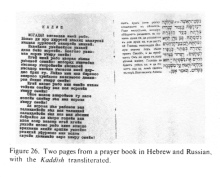
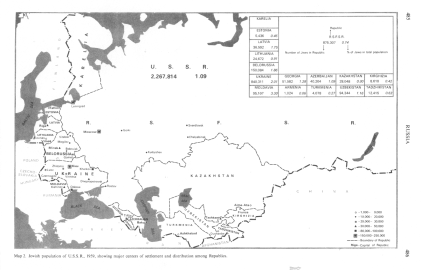


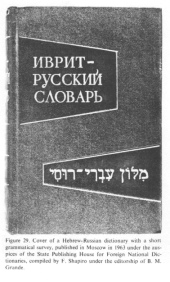

![Encyclopaedia
Judaica (1971): Russia: Jews in "Soviet
Union", vol.14, col. 491. The only
Jewish periodicals still being published in
the U.S.S.R. [[since 1953 approx.]]: Der
Birobidzhaner Shtern and the Sovietisch
Heimland. Encyclopaedia Judaica (1971): Russia:
Jews in "Soviet Union", vol.14,
col. 491. The only Jewish periodicals still
being published in the U.S.S.R. [[since 1953
approx.]]: Der Birobidzhaner Shtern and the
Sovietisch Heimland.](EncJud_juden-in-SU-d/EncJud_Russia-band14-kolonne491-yidd-ztgen-Shtern-u-Heimland-nach1945-45pr.jpg)

